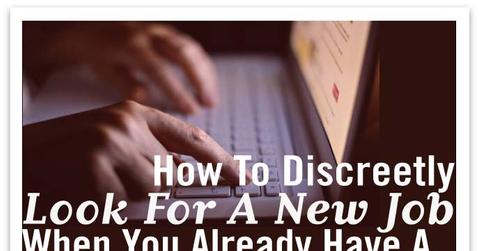Have Job, Will Work For Another

If you already have a job, you’re one of the lucky ones – congrats!
Out of the huge pool of incredibly talented women, you were able to get a job (maybe even one you wanted?!). Sorry for the cynicism – but it’s a cruel world out there. However, it’s not all doom and gloom. Having a job is awesome, right? It pays the bills, gives you a sense of fulfillment, creates a good experience line on your resume, and exposes you to new ideas and ways of doing things. Or…not. What if your current job doesn’t do all those things? Or what if your job is just “okay” and you’d like to reach a little higher? As someone who experienced a situation where I had to search for a new job while holding down my regular job (*multiple times*), I know there are lots of reasons you might be looking for another job. Here were some of mine:
you like the people/environment/culture, but the work isn’t challenging.
you don’t like the people/environment/culture (I’ve run into this many times, which is why I’m planning a transition to self-employment – more on that later!)
you need (or want) to make more money and you can’t get a raise
you want more experience than this job is giving you
you are moving or ready to move on from the organization or industry
you like the people/environment/culture, but the work isn’t challenging.
you don’t like the people/environment/culture (I’ve run into this many times, which is why I’m planning a transition to self-employment – more on that later!)
you need (or want) to make more money and you can’t get a raise
you want more experience than this job is giving you
you are moving or ready to move on from the organization or industry
So, okay, the list goes on. Let’s not dwell on the negative, though! All of these things just mean you are ready for a change. So how do you manage that change?
The first time I knew I wanted a job change was during a work-study job in college. I was working for the academic & career planning office as the marketing assistant. It was my job to create all the online and print marketing materials for that office for students, professors, staff, and parents. I worked primarily with one of the section managers and part of my job was to check in with various stakeholders from time to time and make sure everyone understood our marketing campaign and was on board. That’s where I ran into trouble: this was my first taste of office politics. I soon discovered that this office was rife with high tensions, passive aggression, and backseat drivers. Everyone wanted a hand in the pot, even though not everyone was supposed to be working on the marketing. It became my job to listen, listen, listen, and try to create innovative and updated (read: modern) looking marketing materials that made everyone happy.
As I worked, I learned how to manage personality differences, working styles, and empower people to see themselves as decision-makers even if they technically weren’t. I learned a lot of truly useful things from that job, but I knew after almost two years that I needed a change. After months of complaining to friends and being continually frustrated at the inefficiencies of the office and the roadblocks I was encountering, I decided I needed to put my money where my mouth was.

At the time, I started looking around the campus for other work-study jobs. I needed to have a work-study job for my financial aid package to work, so I made a list of factors for my job search:
had to be Federal work-study approved
had to be 10-12 hours a week
had to pay at least $8/hr
had to be flexible with class schedules
had to be Federal work-study approved
had to be 10-12 hours a week
had to pay at least $8/hr
had to be flexible with class schedules
My situation at the office was delicate – I was originally hired under the tradition that marketing assistants stay for three years. I obviously didn’t want to stay another year, so I decided that the best way to approach the situation was to keep quiet about the job change until I had a job in the bag. (It’s also important to note that I had worked through some conflict resolution strategies and brought concerns to my supervisors before, but to no avail. That’s another good reason to find a new job!)
I started looking through my mental Rolodex. I didn’t find anything on the online job board for campus, and it looked like everything I wanted was already taken.
Around this same time, I was preparing for my senior thesis in art history, so I was talking to my department head a lot. We had a great mentor-mentee relationship, and I eventually told her how dissatisfied I was at the office. She said something to the effect of “I’m so sorry to hear about that. You have a lot of talent…let me think about this.” Literally the next day she caught me in the hallway and offered me a marketing job in the art department.
I recognize this is a pretty open-shut example, but let’s dissect it a little. The process is one you can replicate for your own search:
I recognized my dissatisfaction early, and started looking for a new job about 3 months before I knew they would need to hire a replacement.
I started with a list of must-haves before even looking for a job.
I told people: using my network really helped me in this case. You never know what your contacts have up their sleeves!
I was quiet and tactful about my decision to leave until I had a new job. When my professor offered me the job, I scheduled a meeting with my supervisor the next day and was honest. I was polite, but firm. She did try to get me to stay, but I framed the issue as relating to my time constraints, my interests changing, and that they had given me a lot of great experience (all of which were true).
I created a training and transition plan for the new hire, and even gave input on who they hired.
I wrote personal thank you notes to each staff member I worked with – this was key because I didn’t want to burn bridges.
I recognized my dissatisfaction early, and started looking for a new job about 3 months before I knew they would need to hire a replacement.
I started with a list of must-haves before even looking for a job.
I told people: using my network really helped me in this case. You never know what your contacts have up their sleeves!
I was quiet and tactful about my decision to leave until I had a new job. When my professor offered me the job, I scheduled a meeting with my supervisor the next day and was honest. I was polite, but firm. She did try to get me to stay, but I framed the issue as relating to my time constraints, my interests changing, and that they had given me a lot of great experience (all of which were true).
I created a training and transition plan for the new hire, and even gave input on who they hired.
I wrote personal thank you notes to each staff member I worked with – this was key because I didn’t want to burn bridges.
If you’re thinking about changing jobs, looking for a job on the job can feel a little overwhelming. Each situation is going to call for a unique set of skills and emotional intelligence, but with a little structure, you can make yours a seamless transition. My keys are always to be tactful, frame the problem with positives, stay calm and quiet until you have a job in the bag, and be gracious when leaving the old job.





